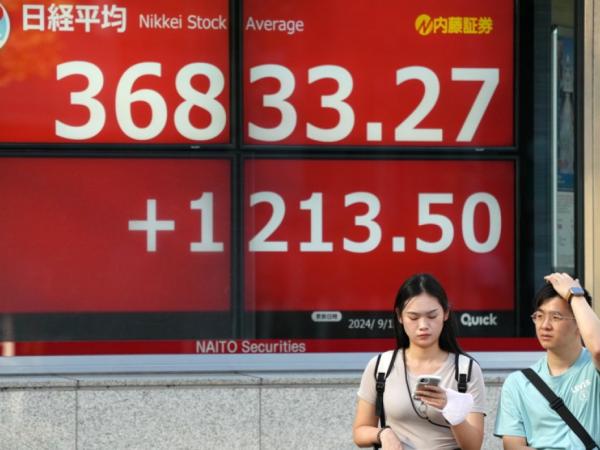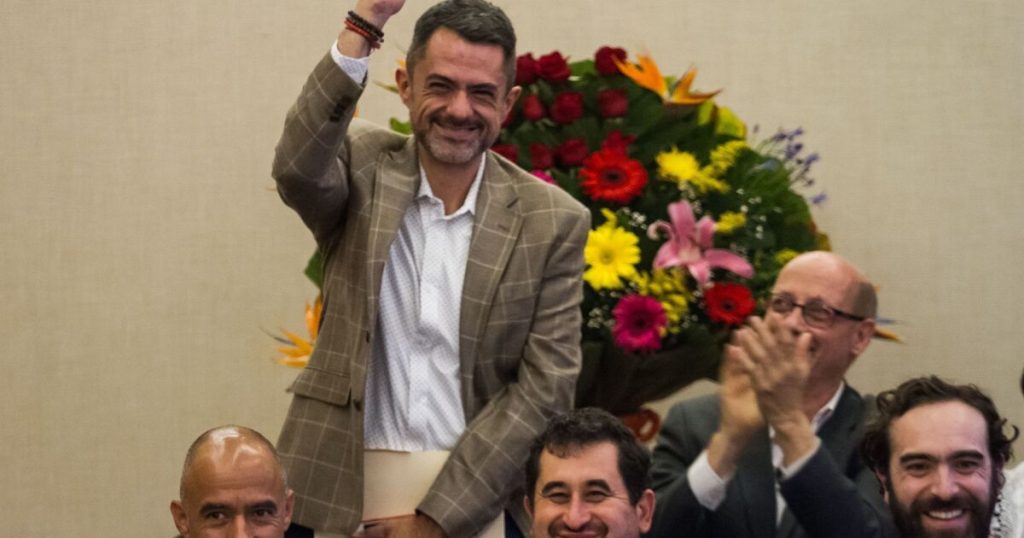There was a time when merchants in Japan were viewed with disdain by those in power.
Some even called them “parasites of society,” says historian John H. Sagers.
It happened in the Edo period, between 1603 and 1867.
But one man was determined to change that view.
“To create a more positive image of modern Japanese business leaders, Eiichi Shibusawa developed a set of ideas he called ‘the unity of morality and economics,’ attempting to reconcile the ethics of Confucianism with market capitalism,” the Linfield University professor wrote.
Shibusawa helped build a new economic system in a country that “was closed for 250 years,” Geoffrey Jones, a professor at Harvard Business School, tells BBC Mundo.
“Japan was very backward compared to the developed West,” he adds.
Although Shibusawa was not the only figure in this process of transformation of the country, he was indeed key. In fact, he is called “the father of Japanese capitalism.”
“He was the leading businessman behind Japan’s industrialisation. There were others, but he was the most visible,” Janet Hunter, a professor at the London School of Economics, told BBC Mundo.
Shibusawa was born in 1840 to a farming family, when Japan was a feudal country.
His father was careful to ensure that Confucianism was at the heart of his education from a young age.
The philosophy of Confucius, a Chinese sage born in 551 BC, constitutes an ethical system that emphasizes social harmony, as well as the importance of studying the past to learn from it and respect for hierarchy and parents.
Confucianism is based on a series of texts called the Confucian Classics, which offer teachings not only on how to behave individually, but also as a society.
“Shibusawa was not born into the samurai class, but rather earned his status through his skills. He was therefore not caught up in the interests of the ruling samurai class of the late shogunate period,” Masaki Nakabayashi, professor of economics at the University of Tokyo, told BBC Mundo.
The shogunate was the name given to the military government during the Edo period.
In his youth, Shibusawa even planned attacks against Western merchants and soldiers stationed in the open port of Yokohama “to defend his nation against Western colonialist penetration,” the professor recalls.
However, he did not participate in these activities because he realized that violence was not the way to bring about the changes he believed were necessary.
The external was not the only thing that worried him.
As he grew up, he viewed with disquiet the status system established by the powerful Tokugawa clan as “encouraging abuses of power while discouraging people from developing their talents and abilities,” Sagers notes in Shibusawa Eiichi and the Merger of Confucianism and Capitalism in Modern Japan.
In addition to gaining ethical training, studying the Confucian Classics also allowed him to interact with the upper-ranking samurai class and the elite.
And so – the author indicates – he decided to put himself at the service of one of the groups of the Tokugawa family, which sought to make reforms in the country.
When he was 27, he was selected to travel with an official delegation to the International Exposition in Paris, which was held in 1867.
“It was a time when Japanese people hardly travelled abroad,” says Professor Hunter. “Shibusawa was part of a very small group that did.”
“At first, he didn’t want to go. He said, ‘Why leave Japan?’ But he never regretted it.”
Years later, he would fondly recall that nearly year-long stay in Europe.
In Europe, Shibusawa observed the results of the industrial and scientific revolutions.
“What he sees in France is both the technology and the business system and he comes back to Japan believing strongly in multi-stakeholder companies – companies that are owned by a broad group of shareholders and not just families,” says Jones.
“I think the French experience in particular is really instrumental in shaping their views.”
In fact, Masaki says that “only after studying the advanced institutions of the West did he become an advocate of introducing Western institutions into Japan.”
“His background and history led him to promote a free and dynamic society to replace a class society. His commitment to his nation guided him to this delicate balance of westernizing Japan without diluting Japanese identity.”
Something that would attract his attention – Sagers recalls – was “the high status enjoyed by merchants and industrial leaders in European societies, a marked contrast to the disdain that Tokugawa samurai officials felt for merchants in Japan.”
Shibusawa reflected on this and put it into words:
“In order for officials and the people to be united in the mission of enriching the nation, the custom of revering officials and despising the people must be ended. This must be done to usher in a new era.”
At the core of Confucianism is the importance of having good moral character, which is achieved through virtuous behavior.
For Confucius, virtue was fundamental.
“Shibusawa gave Confucianism a twist,” Jones notes.
“In traditional Confucian thought, making money was the least virtuous thing there was.” In some respects, “merchants were very frowned upon.”
“Shibusawa reinterprets Confucianism and says that making money is a virtue to serve the nation. Therefore, he always sees business from a broader perspective, that of elevating the nation and the community to a better place.”
Prosperity and wealth achieved through business was, in his opinion, something virtuous.
To understand his thinking it is key to remember the historical context.
“He is talking about a Japan that had been feudal, that was forced to open its borders by the Americans, that saw the countries around it colonized by the West or humiliated, as was the case with China.”
This is how “the role of business in preventing Japan from going down that path” became central to his thinking.
In addition to reinterpreting commercial activity from a Confucian perspective, Shibusawa combined elements of that set of beliefs with economics.
“Historically, Confucianism had a broad current of ideas that people in positions of power, whether economic or political, should take care of people who are less fortunate,” Hunter says.
“Shibusawa personified that in the way he ran business: He believed in taking care of workers.”
“The bottom line was that it wasn’t just about how much profit you made, which was important because how are you going to continue if you can’t make a profit? But you had to make it in a way that served everyone’s interests.”
“The reason he uses ideas from Confucianism is to argue that when it comes to doing business, there is much more to it than just making money.”
“There has to be a broader social goal, and that fits with ideas that have long existed in Confucianism. What Shibusawa does is bring them in.”
Thus, for him, morality and economics went hand in hand. Therefore, developing careers in the business field was a very positive thing because it would promote the well-being of the nation.
And that was “in keeping with the ancient Confucian values of loyalty and public service,” Sager recalls in his book.
In Western terms, Jones explains, Shibusawa believed in what we would call stakeholder capitalism, or ethical capitalism.
“I believed that the purpose of business was to uplift the entire community and that companies always had to be ethical in their behavior toward everyone, stakeholders and employees.”
By serving all stakeholders, businesses help the country as a whole prosper.
For him, “ethics was not a cost, but was essential to building a successful system.”
According to Sagers, throughout his career, Shibusawa promoted a vision of capitalism in which shareholders and managers had a legitimate right to seek private profits in the marketplace, but only to the extent that their enterprises benefited the nation as a whole.
He established what is considered Japan’s first modern bank, Dai-Ichi Bank, and helped establish nearly 500 companies, several of which were instrumental in modernizing the Japanese economy.
“Shibusawa Eiichi’s view of Confucian capitalism was quite straightforward. He said that he followed Confucius’ advice to never do to others what he did not want done to him.”
What he learned as a child studying the Confucian Classics was incorporated into the idea of national progress in which the status one was born with was set aside and value was given to that which was achieved “through virtue, talent, and significant contributions to national welfare.”
Masaki explains that Shibusawa is considered “the father of Japanese capitalism” mainly for his role in establishing the multi-shareholder companies “that drove Japan’s industrialization from the 1880s onwards.”
“This role was notable because most Japanese merchants were unfamiliar with industrial capitalist institutions and were unsure whether Japan could compete with its Western counterparts as an industrial power.”
For example, the expert points out, when Japan had to join a free trade system in 1859, its cotton industry was almost finished off by the very competitive British and Indian cotton industries.
When the company that would lead this sector in Japan was established in 1883, most merchants were skeptical of what could be achieved.
“Shibusawa, who predicted the company’s success, first convinced the nobles, who were (feudal) lords before the Meiji Restoration of 1868, to invest in the company as their social responsibility.”
“The commitment of the old (feudal) lords to this new industry led merchants to invest in the company.”
This scheme made the cotton sector one of the most successful manufacturing industries in modern Japan.
By the 1930s, Japan had overtaken Britain as the world’s leading supplier of cotton.
Professor Masaki points out that the market’s ability to coordinate was key to “overcoming investors’ overestimation of risk.”
“Shibusawa took on that role. That is why he is considered the father of Japanese capitalism.”
“He believed in capitalism as a transparent and open market economy that would become a reality once the general public became aware of its virtues.”
He did not believe in a “quasi-capitalist economy dominated by conglomerates that depended on close relations with the government.”
Jones, who is the author of the book Deeply Responsible Business, says that over the past 10, 15 years, as ESG investing has become more popular around the world, Shibusawa has been rediscovered.
ESG stands for environmental, social and governance, which summarises the concept of socially responsible investment.
“His views are being discussed again, I think even more so than they were some 50 years after his death.”
On July 3, the Japan Times reported that for the first time in decades, Japan had a completely new set of banknotes.
One of them with the face of Shibusawa, the man who believed “that morality and economics were inseparable: one was necessary for the other.”
Click here to read more stories from BBC News Mundo.
You can also follow us on YouTube, Instagram, TikTok, X, Facebook and our new WhatsApp channel, where you will find breaking news and our best content.
And remember that you can receive notifications in our app. Download the latest version and activate them.


















